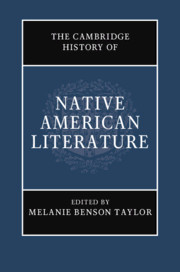Book contents
- The Cambridge History of Native American Literature
- The Cambridge History of Native American Literature
- Copyright page
- Contents
- Figures
- Contributors
- Introduction: What Was Native American Literature?
- Part I Traces and Removals (Pre-1870s)
- 1 Indigenous Languages and the Origins of American Literary History
- 2 Unsettling Colonial Temporalities: Oral Traditions and Indigenous Literature
- 3 Early Native American Literature and Hemispheric Studies
- 4 Performative Cultures of Early America
- 5 Nineteenth-Century American Indian Newspapers and the Construction of Sovereignty
- 6 Indigenous Literacies in Early New England
- Part II Assimilation and Modernity (1879–1967)
- Part III Native American Renaissance (Post-1960s)
- Part IV Visions and Revisions: 21st-Century Prospects
- Index
- References
5 - Nineteenth-Century American Indian Newspapers and the Construction of Sovereignty
from Part I - Traces and Removals (Pre-1870s)
Published online by Cambridge University Press: 18 September 2020
- The Cambridge History of Native American Literature
- The Cambridge History of Native American Literature
- Copyright page
- Contents
- Figures
- Contributors
- Introduction: What Was Native American Literature?
- Part I Traces and Removals (Pre-1870s)
- 1 Indigenous Languages and the Origins of American Literary History
- 2 Unsettling Colonial Temporalities: Oral Traditions and Indigenous Literature
- 3 Early Native American Literature and Hemispheric Studies
- 4 Performative Cultures of Early America
- 5 Nineteenth-Century American Indian Newspapers and the Construction of Sovereignty
- 6 Indigenous Literacies in Early New England
- Part II Assimilation and Modernity (1879–1967)
- Part III Native American Renaissance (Post-1960s)
- Part IV Visions and Revisions: 21st-Century Prospects
- Index
- References
Summary
The chapter points to the textual plurality of early Native newspapers, and particularly how their dense texture simultaneously conserves traditions and adapts to the new circumstances of modernization. The close readings in this chapter discuss two Indigenous periodicals: The Cherokee Phoenix and Copway’s American Indian, as well as related nonfiction texts. The chapter argues that antebellum Native publications are complex media artifacts whose relation to the construction of sovereignty is articulated through seriality; the circulation and reprinting of particular types of texts for particular readers; and material properties like the nonlinear and multisensory dynamics of the periodical’s page arrangements. It shows that the papers’ somewhat chaotic mixture of clippings, texts, and images constitutes a powerful discursive construct and, as a distinct media form, places Native writing at the vanguard of a transnational and transindigenous criticism of imperialism in the tumultuous decades of the early nineteenth century.
Keywords
- Type
- Chapter
- Information
- The Cambridge History of Native American Literature , pp. 89 - 112Publisher: Cambridge University PressPrint publication year: 2020
References
- 2
- Cited by



